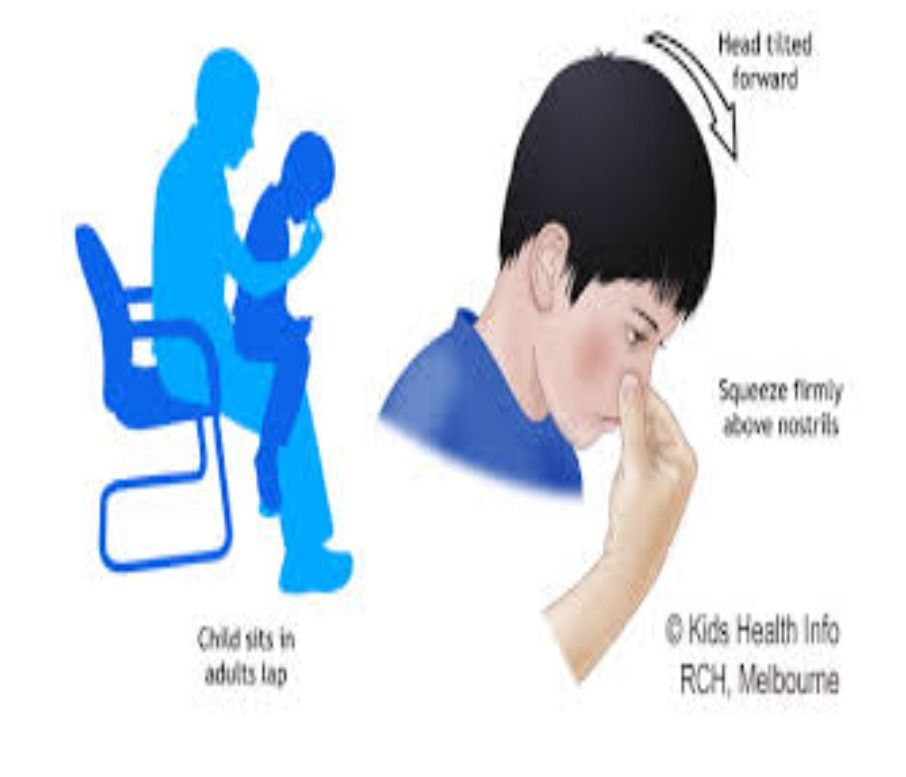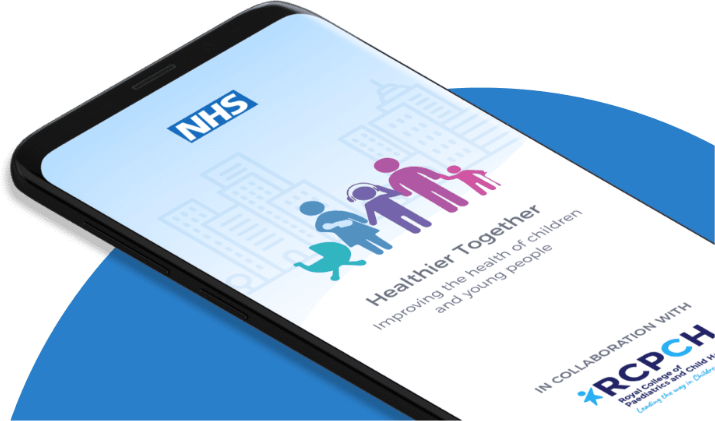Nose bleeds
Nose bleeds are common in childhood and normally get better by themselves. It is mostly caused by minor injury to the nose lining such as nose picking but can also be caused if your child has had a recent cough or runny nose, if they have allergic rhinitis, or a foreign body in their nose.
The bleeding is usually from the front part of the nose and whilst the amount of bleeding may seem like a lot (such as soaking through tissues), it is rare for children to lose so much blood that it causes any problems (such as anaemia). This would only happen with frequent, heavy nosebleeds over several weeks or months.
If your child has had a nosebleed as a result of a head injury please look at our page here.
The advice below should help you decide whether your child’s nose bleed requires further help or whether it can be managed by yourself at home.
If your child has any of the following:
-
Bleeding for more than 15 minutes despite appropriate first aid
-
Bleeding from both nostrils
-
Choking on the blood despite sitting your child upright and getting them to lean forward
-
Nose has changed shape after injury to the face
-
A problem with their blood clotting or is on medication that thins the blood (such as warfarin, heparin or aspirin)
-
Child under 2
You need urgent help
Go to the nearest Hospital Emergency (A&E) Department or phone 999 (first aid should be started simultaneously – see below)
If your child has any of the following:
-
Regular small volume nose bleeds that respond to first aid
-
Nose bleeds and bruised skin anywhere on the body or a family history of a bleeding disorder
You need to contact a doctor or nurse today
Please call your GP surgery or contact NHS 111 - Go to 111.nhs.uk or call 111 (first aid should be started simultaneously – see below).
(111 online does not currently take questions about children aged under 5, so if your child is 4 or younger, please call 111).
If symptoms persist for 4 hours or more and you have not been able to speak to either a member of staff from your GP practice or to NHS 111 staff, recheck that your child has not developed any red features.
If none of the above features are present:
Care using the advice below, can be provided to your child at home if none of the above features are present. If your child continues to get frequent nose bleeds, please arrange to speak to your GP or practice nurse.
Self care
Continue providing your child’s care at home. If you are still concerned about your child, speak to your health visitor, local pharmacist or call NHS 111– dial 111
First aid for nose bleeds:
During a Nosebleed:
-
Gently pinch the soft, fleshy part of your child’s nose (just below the hard bony part) using your thumb and finger. Hold it firmly for 20 minutes without letting go
-
Keep your child sitting upright and leaning slightly forward. Encourage them to breathe through their mouth
-
Ask your child to spit out any blood instead of swallowing it, as swallowing blood can upset their stomach and cause vomiting, which may restart the bleeding
Helpful Tips:
-
Reassure your child and keep them calm. Talking softly can help them relax
-
Avoid releasing the pressure to check if the bleeding has stopped until the full 20 minutes are up
-
If ice is available, your child can suck on a small piece, or you can place an ice pack on their forehead or the back of their neck. Offering a cool drink may also help them feel better
If the bleeding continues after 20 minutes, check that you are pinching the right spot and apply pressure for another 10 minutes.
If the nosebleed still doesn’t stop, call an ambulance and continue applying pressure until help arrives.

After the Bleeding Stops:
For the next 24 hours, encourage your child to:
-
Avoid picking or blowing their nose
-
Do calm and quiet activities, like reading or drawing
-
Avoid hot baths, showers, or warm drinks
Preventing Future Nosebleeds:
-
If your child’s nose is dry, apply a little Vaseline (or a similar product) inside their nostrils twice a day for a week. Use a cotton swab or your finger, but this is best for kids over 4 years old who can stay still
-
If your child is constipated, increase their water and fiber intake (like fruits, vegetables, or whole grains). If needed, ask your doctor or pharmacist about a stool softener to prevent straining
Where should you seek help?
- If it is non-urgent, speak to your local pharmacist or health visitor
- If your child has any of the above features, urgently see your GP. For an urgent out-of-hours GP appointment, call NHS 111
- You should only call 999 or go to your nearest Emergency Department (A&E) in critical or life threatening situations
For wear and tear, minor trips and everything in between
Self-care
You can treat your child's very minor illnesses and injuries at home.
Some illnesses can be treated in your own home with support and advice from the services listed when required, using the recommended medicines and getting plenty of rest.
Sound advice
Children can recover from illness quickly but also can become more poorly quickly; it is important to seek further advice if a child's condition gets worse.
For information on common childhood illnesses go to What is wrong with my child?
Pharmacists are experts in many aspects of healthcare and can offer advice on a wide range of long-term conditions and common illnesses such as coughs, colds and stomach upsets. You don’t need an appointment and many have private consultation areas, so they are a good first port of call. Your pharmacist will say if you need further medical attention.
Sound advice
- Visit a pharmacy if your child is ill, but does not need to see a GP
- Remember that if your child's condition gets worse, you should seek further medical advice immediately
- Help your child to understand - watch this video with them about going to the pharmacy
For information on common childhood illnesses go to What is wrong with my child?
The 0-19 Service for children and young people is delivered by Oxford Health NHS Foundation Trust and offers a single point of access for Health Visiting, School Nursing and the Family Nurse Partnership. You can contact the teams using the details below:
Single Point of Access (SPA): 01865 903 800
Email: cyp0-19@oxfordhealth.nhs.uk
Chat Health Parentline
Text us any time for confidential advice and support and you will have a response the next working day (Monday-Friday exluding Bank Holidays).
Parents and carers for children aged 0-4: Text 07312 263 081
Parents and carers of children aged 5-11: Text 07312 263 227
Young people aged 11-19 and their parents and carers: Text 07312 263 08
Health Visitors
Health visitors are registered nurses or midwives who have additional training in community public health nursing. They provide a universal service, targeted to individual needs for children aged 0-5 years. Learn more about the Oxfordshire Health Visiting Service here!
School and college Health Nurses
School Health Nurses are specialist public health nurses and have offices across Oxfordshire. They work very closely with Health Visitors to support school aged children. They are available for young people to access in secondary schools and colleges, and offer a service to children who are home educated. They work closely with children, young people and their families to support and promote health and wellbeing. Learn more about the Oxfordshire School and college Health Nursing Service here!
Family Nurse Partnership
The Family Nurse Partnership service supports parents who are aged 19 years or under at conception, or under 21 years if they have been in care. The Family Nurse works alongside younger parents in their home, offering health, wellbeing and development support and information from the early stages of pregnancy, usually up until your child is two. Learn more about the Family Nurse Partnership service here!
GPs assess, treat and manage a whole range of health problems. They also provide health education, give vaccinations and carry out simple surgical procedures. Your GP will arrange a referral to a hospital specialist should you need it.
Sound advice
You have a choice of service:
- Doctors or GPs can treat many illnesses that do not warrant a visit to A&E
- Help your child to understand – watch this video with them about visiting the GP or going to a walk in centre
For information on common childhood illnesses go to What is wrong with my child?
If you’re not sure which NHS service you need, you can call 111 or use 111 online.
Please note that 111 online is for people aged 5 and over. Call 111 if you need help for a child under 5.
An adviser will ask you questions to assess your symptoms and then give you the advice you need, or direct you straightaway to the best service for you in your area.
Sound advice
Use NHS 111 if you are unsure what to do next, have any questions about a condition or treatment or require information about local health services
For information on common childhood illnesses go to What is wrong with my child?
Emergency Departments (A&E) provide vital care for life-threatening emergencies, such as loss of consciousness, suspected heart attacks, breathing difficulties, or severe bleeding that cannot be stopped. If you’re not sure it’s an emergency, call 111 for advice.





